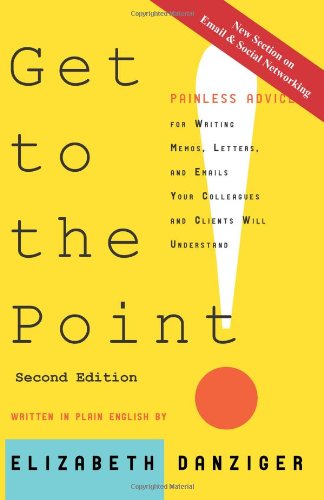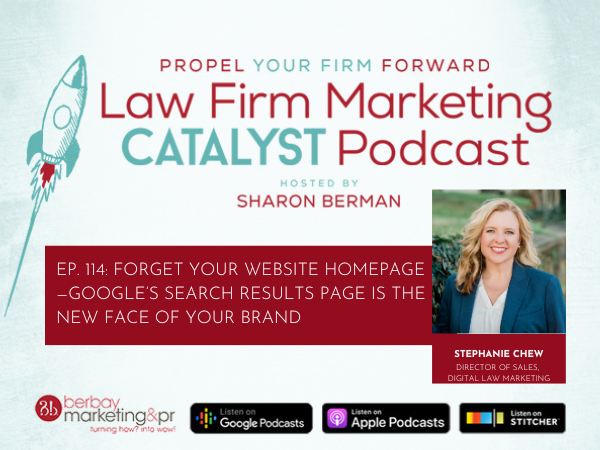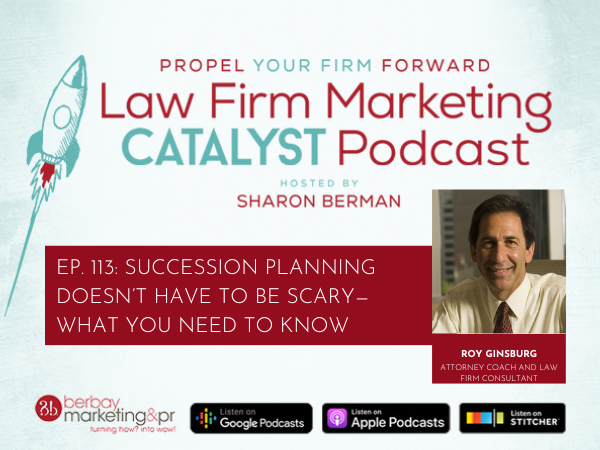Episode 99
What you’ll learn in this episode:
- Why getting your message across is the most important goal of writing
- How strong writing skills help people move up in their careers
- How to remove filler words from your writing
- Why proofreading is necessary, even if it’s not important to you personally
- Elizabeth’s top three tips for clearer writing
About Elizabeth Danziger
Elizabeth Danziger, the founder of Worktalk Communications Consulting, is a seasoned written communications expert with over 30 years of experience. She has a longstanding reputation for training people to become compelling, confident writers. Danziger is the author of four books published by major publishers, including Get to the Point!, a text on business writing initially published by Random House. Her work has also appeared in many magazines, including Personnel Journal, Journal of Accountancy, and other national publications.
She enables people to wield the power of words to enhance their credibility and catapult ahead in their careers.
Additional resources:
Facebook is www.facebook.com/upworktalk
LinkedIn: www.linkedin.com/elizabethdanziger
Twitter: www.twitter.com/writaminlady

Law Firm Marketing Catalyst Podcast
Love it or hate it, writing is a daily part of our lives. And according to author, writing consultant and communications expert Elizabeth Danziger, people who write well are more likely to advance in their careers. That’s why she founded Worktalk Communications Consulting, a firm that trains professionals to write clearly and confidently. She joined the Law Firm Marketing Catalyst Podcast to talk about the importance of rereading; the power of language; and her tips for stronger writing. Read the episode transcript here.
Sharon: Welcome to The Law Firm Marketing Catalyst Podcast. Today, my guest is Elizabeth Danziger, head of Worktalk Communications. Worktalk prepares teams to write clearly and confidently so they can strengthen their credibility, increase their influence and generate new possibilities. Liz is also the author of the book “Get to the Point! Painless Advice for Writing Memos, Letters and Emails Your Colleagues and Clients Will Understand.” Worktalk also has a very interesting newsletter called “Writamins,” and it’s chock full of interesting information you’ll want to know. Make sure to sign up for it. We’ll have a link at the end of the program. Today, Liz will be talking about how we can make the best use of language. Liz, welcome to the program.
Elizabeth: Thank you. It’s a pleasure to be here.
Sharon: So glad to have you. Every time I read what you’ve written, I go, “Oh my god, it’s so useful.” I have to say, I took a course from Liz years ago and the one thing I always do—Liz, I don’t know if you still have my emails, but you did get me to reread my emails before I sent them.
Elizabeth: Great!
Sharon: I still do that. I always remember that, because you’re right. You catch things you didn’t realize were there.
Elizabeth: Oh, that’s wonderful.
Sharon: Tell us about your career path. Were you always into words and grammar? Was that always of interest to you?
Elizabeth: When I was a child, I wanted to be a doctor, actually. I wanted to be a physician, but I also always loved to read. I remember my mother yelling at me, like, “Why don’t you go out to play?” and I’d be like, “No, I want to read.” I’ve always been a great reader. Then, when I got to college and hit organic chemistry and calculus, I thought, “Well, maybe my skills are better suited elsewhere,” and I became a writer.
My first book was published when I was 25, and it did well domestically and internationally. Then I wrote two more books, including “Winning by Letting Go,” published by Harcourt Brace Jovanovich. I wrote for all the women’s magazines, and then I decided I wanted to work with people who were doing real things in the real world and making life happen, and not necessarily the editors of Cosmo. I also realized there’s a huge need. People suffer over their writing. They suffer personally and internally, and they suffer bad consequences from lost business, lost relationships, lost possibilities. So, I founded Worktalk to support people in making themselves understood.
Sharon: How do you do this? We took a class with you, but do you work with people individually? Is it sessions? How do you do that?
Elizabeth: I work with people however they want to be worked with. Notice that I ended a sentence with a preposition, which is totally O.K. Most of our work takes the form of webinars and training sessions. We customize every one of our webinars to our clients. We get writing samples. It’s like sending a blood test to the doctor. You send me your writing sample and I see what’s going on. So, it’s mostly trainings and webinars.
We also do writing labs, which are much smaller. Each person brings one writing sample and we workshop each other’s work in the lab. Of course, I do one-on-one coaching, but mostly it’s trainings and webinars. Ultimately, we work with people in whatever way they need.
Sharon: I think there are a lot of people who have a love of reading, but how did your love of reading translate into understanding grammar? It seems like that’s a different thing in a sense.
Elizabeth: Truthfully, people think of me as a person associated with grammar. I didn’t really study grammar until I started teaching writing. I was a writer, and I was edited by book publishers, by Hartcourt Brace Jovanovich and Random House and by the editors of Cosmo and the editors of Glamour and the editors of all these magazines. They edited me. When I decided to start doing writing training, I think a lot of it came to me intuitively. Then, when I started teaching it, I realized I had to get the rules down. That’s why I tell people grammar is extremely important, of course, but getting your message across is the most important thing.
Sharon: I’m not trying to put words in your mouth, but when we work with lawyers, they go to school to learn how to write in a certain way. Is there resistance, or is it more difficult to untrain them to write for the normal person?
Elizabeth: It is a little more difficult. With respect, lawyers really think they know a lot about a lot, and they’re trained to argue; they’re trained to think you’re wrong. So, there is a little more resistance, but at the same time, I’ve worked with law firms. I’ve worked with associates who are getting dinged for the writing. Their writing’s not clear; their writing’s not to the point; their writing doesn’t catch the issue. When I work with associates, they end up getting that taken off their performance review and they turn into good writers. I’ve also worked with legal firms on other things, but I love working with lawyers because they’re smart. Not that people who aren’t smart shouldn’t call me—not that anyone would identify themselves at not smart. It’s fun to work with people who learn quickly. It’s fun.
Sharon: That’s interesting, because it seems like if you’re working with associates, there are people higher up, perhaps partners, who aren’t—and once again, as you say, with respect—aren’t as good a writer or as to-the-point, and they’re evaluating somebody else.
Elizabeth: I’m not sure about that. My experience in all fields, in accounting, business, finance and law, is that the people at the top, they’re almost always good writers, I would say. Good writing and good thinking go hand in hand, and you cannot rise to the top if you’re not a really good thinker, hopefully. People who write well tend to get promoted in professional service firms. Very often, the managing partner is an exceptional writer, but the managing partner, believe it or not, has other things to do than to edit the crappy writing of the people who work for them. They need to be managing the firm. That’s why they outsource to me if their associates are not up to snuff, but the top people are often good writers.
Sharon: That makes a lot of sense. They have to be persuasive, and they have to get their clients’ attention, which means being to the point.
Elizabeth: Right.
Sharon: How is what you do changing today? When people are texting and abbreviating every other word—Liz is rolling her eyes here. I find myself doing that, or I’ll make a mistake and think, “Well, nobody’s going to notice that or know that’s a mistake,” and then I say, “Sharon, you can’t do that. It’s not right.” How do you deal with that?
Elizabeth: That’s an excellent question, and I can look at it in a couple of ways. One is that I am fighting the good fight. Like Winston Churchill said, “Fight the good fight.” Although there is a lot of texting, Slack, Whatsapp, whatever, the thing is that—and this is getting a little philosophical—if we think about it, what is the function of language? I’m sure we all love dolphins and pot-bellied pigs and whales, but they’re not building legal systems; they’re not building cultures; they’re not doing what humans are doing. We are doing it because we have language, really sophisticated, nuanced language that can create a future and a past. It’s powerful.
Language conveys meaning, but why bother to get something from my head into your head? How do we get this from my head into your head? Because we have a set of agreements. We agree. The sounds I’m making mean something. The scribbles on the page mean something, and you can make a certain number of errors in those agreements. Grammar is just a set of things we agree on. When I say, “I was,” it means it happened already. We agree on that. But if you break too many of those agreements of grammar, it creates friction in the system, and your meaning starts to fall apart. You literally lose meaning, and that’s why I know the work I do is evergreen. In every class, I ask people, “Have you ever gotten an email from someone that had so many grammar and punctuation errors that you literally didn’t know what the person was talking about?” and everybody says, “Yes.” It’s true that people are more casual about it, and the winners, the people who end up on top, are going to be the people who communicate with a nuance and a correctness and a sophistication.
Sharon: Do you find yourself texting and abbreviating things?
Elizabeth: No, I never do. I dictate my texts, and I usually proofread them. I just don’t do that. Maybe it’s because I’m a boomer. I also tell people not to do it, so I don’t do it.
Sharon: It’s interesting to me how the world has changed. I do have to throw this out: I’m flabbergasted that they’re not teaching cursive writing in some areas.
Elizabeth: I know. What’s sad is that there’s a lot of research on the whole process of writing by hand, the neurology and neuroscience, and there is an additional layer of writing in cursive. When you take notes by hand or when you write in cursive, different things are happening inside your brain that are enabling you to process that information at a deeper level. On a simple level, I wonder how those people are going to sign their names when they grow up. If you’ve never learned cursive, what is your signature going to look like? I don’t know. But you’re right. Of course, I have to deal with people texting and Slacking and this and that, but in the end, the bottom line of language is the same: get your message across. That’s what we aim for.
Sharon: When you’re teaching a class of law firm associates or younger people, let’s say, do you hear more, “Oh, Liz, that’s not important”?
Elizabeth: I do. What’s interesting is in my section on proofreading, I always ask people, “When you receive a document that’s not carefully proofread, how does it affect your opinion of the person who sent it? Positively, negatively or no impact?” I talk to people all over the country, and in most cases, the majority of people say it has a negative impact on their opinion of the person who sent it. Yet there are certain cultures and certain groups and subgroups where a lot of people will say it makes no impact on them. They don’t care if somebody doesn’t proofread. What I tell those people is, “O.K., so the person on your team, that person may not care at all if you proofread. Knock yourself out. But I promise you, if you write to a CEO or the government or the executive vice president or the division manager, that person will care.” Many people still do care, and we have to take care of that. We have to write for the top, not to the least common denominator.
Sharon: That’s a good way to put it. I think certain professions care more. We were the recipient of this, because a firm that became our client, they switched firms because they said their other firm wasn’t proofreading.
Elizabeth: Oh my gosh! I saw this in a client, a regional accounting firm that had been approached by the client of another regional accounting firm. The other firm was a very reputable firm, a good firm, and I asked my client, “Did you ask them why they are talking to you? This is like somebody who already has a girlfriend going on a date. Why are they talking to you if they already have an accounting firm?” He asked them, and what they told him was that their firm consistently misspelled their name.
Sharon: That would be a zinger, let’s say.
Elizabeth: Yeah.
Sharon: Tell us some of your top secrets or your words of advice for us to keep in mind.
Elizabeth: There are three things I would suggest. The first is that you think about your reader before you write. It sounds very simple, but it astounds me sometimes how rarely people do that. They sit down and think, “Tap, tap, tap,” and they’re not visualizing the living, breathing human being who’s on the receiving end of that. What do they care about? What are their hot buttons? What are they wondering? What are their questions? Write for the reader. That’s the first thing.
Second, write shorter sentences. Your average sentence range should be around 20 words. That doesn’t mean every one should be boom, boom, boom, 20, 20, 20. Maybe some 15, maybe some 25, maybe some 30, but if you have a 30 or 35-word sentence, I want you to put two 10-word sentences around it. Microsoft Word’s check readability statistics function will calculate your average sentence. That’s the second thing, to write shorter sentences, and a whole cascade of good things will happen.
The third, as you remember from when we talked years ago, Sharon, is to always, always reread. You’ve got to reread what you wrote and make sure you didn’t write something incredibly dumb, especially for attorneys. Attorneys are held to a higher standard. The scary thing about not proofreading is that people generalize. They think if you’re careless at this, you’re careless at that. If there’s a typo in the cover letter you send to your client, “Here’s the contract you asked me to draw up,” and you write “contact” instead of “contract,” and it goes straight through spell check because contact is also a word, I promise you they are going to have less confidence in the validity of the contract because there was a typo in the cover letter. That’s just how we roll. It’s crucial to reread and proofread everything no matter how hurried you are. The time it takes to backtrack and grovel and apologize and try and make it right is so time-consuming that it makes the time that we spend proofreading seem very, very short.
Sharon: That’s a good point, what you say about lawyers being held to a higher standard. If I got a cover letter or a document from a lawyer where there was a typo, I would think, “Oh, my god, what kind of work am I going to get from this person, exactly?”
Elizabeth: It’s terrifying
Sharon: Yes, it is.
Elizabeth: It’s truly terrifying.
Sharon: That’s true. If I got a typo in a cover letter, it would reflect poorly on the person, but if it came from the guy who’s going to paint my house, I don’t think I’d be thinking in the same way.
Elizabeth: Exactly, that’s a great point. We have different expectations from different people. People have the highest expectations of lawyers because they associate them with precision and language, and because they rely on them to use language to plead their case.
Sharon: That’s true. Rely—that word really hit me. They’re advocates.
Elizabeth: Exactly, good point.
Sharon: I want to ask you two things. Are you going to be writing another follow-up to the second edition of your book “Get to the Point”?
Elizabeth: I’ve already done a second edition. I thought about doing a third edition, but I’m very busy with work right now, and it’s a huge time commitment. I think I keep people posted by keeping up the Writamins. If you subscribe to Writamins, you’ll get all the latest.
Sharon: Yes, and we’ll have the link in the podcast description when we post it. One of the latest versions was talking about filler words. As I was writing something the other day, I thought, “Wait, that’s a filler word,” and I took it out.
Elizabeth: Great! It really affects you. I’m so gratified.
Sharon: I never thought about it, but it’s something I use all the time. Give us examples on how we get rid of them.
Elizabeth: A lot of it is just thought and self-discipline. I wish I could say, “Give me $29.95 and I’ll slice and dice and microwave and cut and reduce filler words.” That would be really nice. I would be a millionaire, a multimillionaire, if I could do that. A lot of it goes back to rereading. We also need to be aware of words like “just.” I’m sorry to say this happens more often with women than with men. Men and women both do it, but women are particularly prey to “just” or “sorry.” I would like to bury these words. In other words, if I say to you, “I’m very, very sorry,” do I sound sorrier than if I said, “I’m sorry?”
Sharon: That’s a good point, yeah.
Elizabeth: To my ears, the person who says, “I’m very, very sorry,” I would not necessarily say that person is twice as sorry as the person who says, “I’m sorry.” I wrote a Writamin about this. You probably remember. I was about “I would like to,” and “I wanted to.” Oh my gosh! Please read the Writamin, everyone. It’s on the website. It’s at Worktalk.com.
Sharon: Great information. It’s so much to remember. Liz, thank you very much. Whether it’s a certain rule or whether it’s knowing that we need to get to the point faster, that’s the most important thing you’re talking about. Thank you so much for talking with us today. It’s really been great. I don’t know how many filler words I’m using there.
Elizabeth: No, you’re doing great.
Sharon: Really, really great.
Elizabeth: Really, really, really, really, so, so, so great.
Sharon: Thank you so much for being with us.
Elizabeth: You’re very, very welcome. Thank you for letting me be on this show. I appreciate it.
Sharon: It’s great to talk with you.



